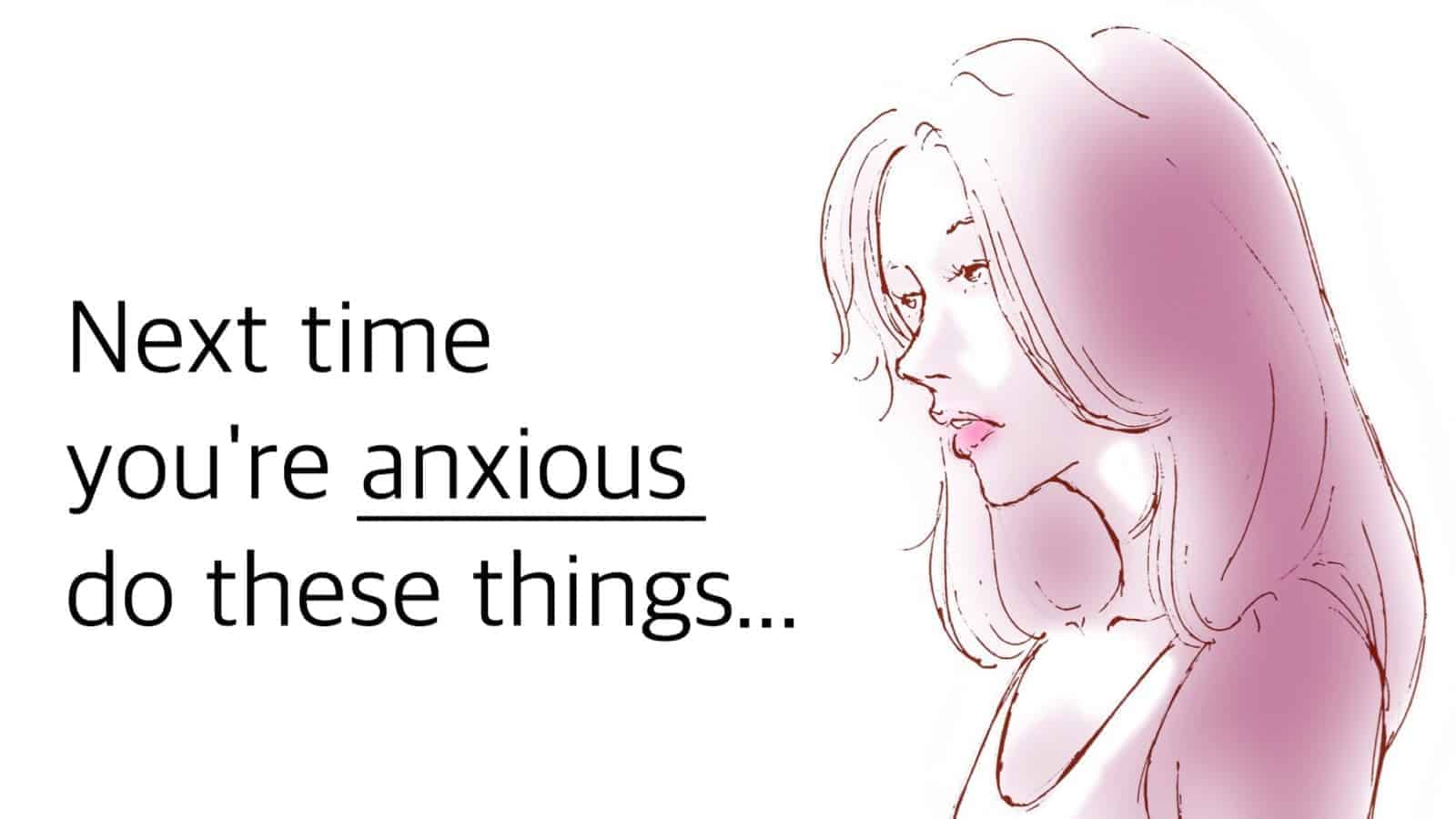“Life is ten percent what you experience and ninety percent how you respond to it.” – Dorothy M. Neddermeyer
Anxiety is much more common than people want to believe. If you suffer from anxiety, don’t worry. You’re not alone, but do not repress anxious thoughts. “Repressing anxious thoughts won’t work; they will just pop up again, sometimes with more intensity,” says psychologist, life coach and author Melanie Greenberg, Ph.D.
There are ways to help yourself feel calm again when you feel overwhelmed with anxiety. Here are some of the best anxiety management tricks to help you calm down, approved by therapists and mental health experts.
Here Are 10 Anxiety Management Tricks To Help You Feel Calm
1. Breathe
This may seem like a no brainer, but when the anxiety hits, it can be difficult to remember to breathe. Focusing on your breathing is a sure-fire way to help yourself calm down when you’re feeling anxious. Author Robert Cooper, Ph.D. says, “Breathing from your diaphragm oxygenates your blood, which helps you relax almost instantly.”
Breathing in for a count of five and then out for a count of seven will help you focus your mind and relax your body. Deep breathing will also help get rid of the flight-or-fight response that anxiety often triggers in our bodies.
2. Find a support system
Anxiety is hard to deal with on your own. It’s best to make sure that you have people in your life who will support you when the anxiety gets to be overwhelming. “Research shows that people who encounter major life stresses, such as the loss of a spouse or job, come through the ordeal more easily if they have an effective network of friends or family for social support,” says psychotherapist Ben Martin, Psy.D.
A support network of people can help distract you, calm you down, or give you a reality a check when you really need it. You don’t have to deal with anxiety alone. There will always be people who are going to love you and accept you, so make sure you reach out to them during your time of need.
3. Think positive
Anxiety can occur when negative thoughts start to seep into our day-to-day lives. Stopping those thoughts before they cause anxiety is the key to staying calm. One of the best ways to stop negative thoughts in their tracks is by focusing on the positive.
Purposely focusing on positive thoughts will help you calm down by keeping the negative thoughts at bay. The power of positive thought shouldn’t ever be underestimated. It can even help to write out all of the positive things you experienced that day, or the positive things happening in your life.
4. Avoid caffeine
If you’re prone to anxiety and also drink a lot of caffeine like coffee or soda, you may want to cut back on those types of drinks. “If you’re feeling keyed up all day and having trouble sleeping, look at your caffeine intake,” says wellness expert and health coach, Dr. Susan Biali Haas.
Since caffeine is a stimulant, it’s prone to making anxiety disorders worse. Keeping your caffeine intake to a minimum will help you deal with flairs of anxiety when they do happen. Instead, make sure you’re drinking enough water and staying hydrated. Speaking of…
5. Stay hydrated
When anxiety starts to spike, make sure you’ve got a glass of water nearby. Oftentimes, our bodies have what’s called a “diving instinct” that will calm us down so we don’t drown when we are submerged under water. Like with diving! Many people with anxiety have found that drinking a cool glass of water can have the same effect when they’re feeling anxious. Not only that, but staying hydrated is good for your body and your brain, helping your anxiety.
6. Learn your triggers
Anxiety usually happens for a reason, with what mental health professionals call “triggers.” A certain situation or event can trigger you into feeling anxious. One of the best ways to handle your anxiety is to learn exactly what those triggers are. If you don’t know what you’re anxious over, it can be harder to calm yourself down. But once you learn your triggers, you’ll be much more likely to be able to calm yourself down when the anxiety starts to spike.
7. Maintain good sleep habits
Getting a good night’s rest will help you combat your anxiety before you even start to feel the symptoms.
“If you’re sleeping less than 6 hours a night, you’re probably looking at a prime cause of your anxiety. True, anxiety can make it hard to sleep, but if there’s any way you can get eight hours of sleep a night you should notice an immediate difference in your mood,” says Dr. Haas.
Getting ahead of the game is a great way to make sure that you can find ways to calm yourself down again once anxiety starts up. When you’re sleeping well, you’ll be able to stay calm and keep your head clear.
8. Exercise
Yes, exercise can help deal with anxiety. It can help you before the anxiety hits, but it can also help you even out your anxiety when it starts. Go for a jog, or even just a brisk walk around the neighborhood if you can.
“The key is to get up and move,” says Dr. Cooper. Sometimes, all you need to do is get your blood pumping so that you can give all that excess energy some place to go.
9. Accept what you can’t control
There’s only so much that you can control in life. You can’t control other people, or most situations. Instead, you can only control your own actions, and your response to situations.
“Recognize that, sometimes, all you can control is your effort and your attitude. When you put your energy into the things you can control, you’ll be much more effective,” says psychotherapist and author, Amy Morin, LCSW.
Anxiety often happens when we feel out of control. Take what you can control and allow yourself to let go of the things that you can’t. Doing this can help calm you down when anxiety gets to be too much.
10. Find a coping mechanism
Coping mechanisms can help with anxiety, and many mental health professionals swear by them. A coping mechanism is something that you can do when you start to feel anxious that can help you ground yourself and deal with the anxiety. “Engage in an activity that brings you joy or requires all of your attention,” says Rallie McAllister, MD, MPH.
Some coping mechanisms include writing, drawing, singing, exercise, talking to someone, cooking – anything that doesn’t include maladaptive activities is a good thing when it comes to anxiety.
Final thoughts
Anxiety is no fun, but no matter what, you will be able to find a way to calm yourself down when it starts to happen.
“Learn how to recognize worry, and then replace it with thinking. Worry is when your thoughts are stuck on the problem. Thinking is when you are focused on finding a solution. Worry is useless and counterproductive—thinking is progress,” says time-management coach and author, Kimberly Medlock.
Keeping a positive outlook and learning how to deal with the physical symptoms of anxiety will lead you to be able to deal with the mental symptoms. And don’t forget, your support system is always there to help you.
https://youtu.be/FWMSYeRHWU4
















